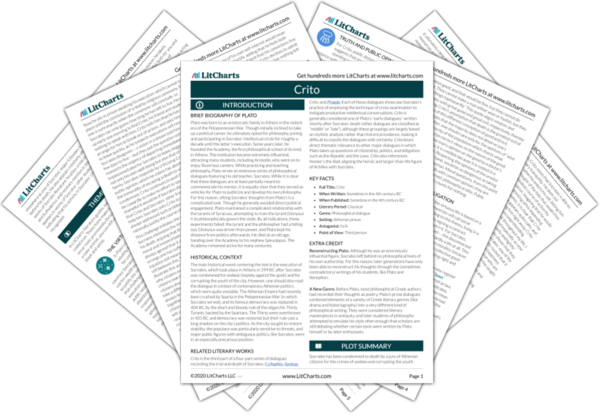Welcome to the LitCharts study guide on Plato's Crito. Created by the original team behind SparkNotes, LitCharts are the world's best literature guides.
Crito: Introduction
Crito: Plot Summary
Crito: Detailed Summary & Analysis
Crito: Themes
Crito: Quotes
Crito: Characters
Crito: Symbols
Crito: Theme Wheel
Brief Biography of Plato

Historical Context of Crito
Other Books Related to Crito
Key Facts about Crito
- Full Title: Crito
- When Written: Sometime in the 4th century BC
- When Published: Sometime in the 4th century BC
- Literary Period: Classical
- Genre: Philosophical dialogue
- Setting: Athenian prison
- Antagonist: N/A
- Point of View: Third person
Extra Credit for Crito
Reconstructing Plato. Although he was an enormously influential figure, Socrates left behind no philosophical texts of his own authorship. For this reason, later generations have only been able to reconstruct his thoughts through the (sometimes contradictory) writings of his students, like Plato and Xenophon.
A New Genre. Before Plato, most philosophical Greek authors had recorded their thoughts as poetry. Plato’s prose dialogues combined elements of a variety of Greek literary genres (like drama and historiography) into a very different kind of philosophical writing. They were considered literary masterpieces in antiquity, and later students of philosophy attempted to emulate his style often enough that scholars are still debating whether certain texts were written by Plato himself or by later enthusiasts.







